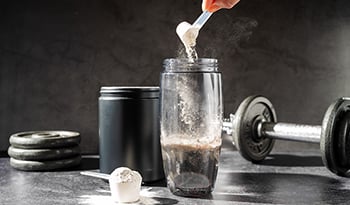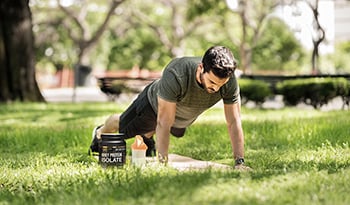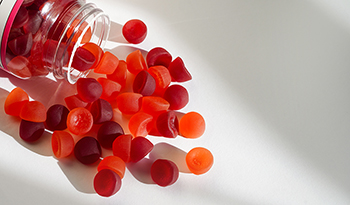A Comprehensive Guide to Supplementing with Creatine

Creatine is a naturally occurring substance found primarily in muscle cells. It is obtained from dietary sources, primarily meat and seafood, with a smaller portion produced by the body.1 Without any supplementation, our muscle stores of creatine are typically around 60-80% saturated.2 Since vegetarians don’t have a significant source of dietary creatine, their baseline muscle stores of creatine tend to be even lower and therefore benefit to a greater extent from supplementation.1,3 Creatine’s primary function is to replenish stores of Adenosine Triphosphate (ATP), the molecule that is used for energy within our cells. During brief intense bouts of exercise, the ability to quickly regenerate ATP is limited partly by the available creatinine in the muscle.
Creatine has been heavily studied since the 1980s, with over 1,000 studies published. The primary performance benefit to supplementing with creatine is an increased work capacity in the gym and on the field. Most studies addressing performance improvements have found an improvement of about 10-20% in high-intensity exercises. 4 For example, in a study on resistance-trained men, the group that received creatine was able to perform on average 1-2 additional reps on each of five sets of bench press taken to failure.5 Although 1-2 additional reps might not seem like a lot, over time the ability to do 10-20% more repetitions translates to increased muscle building and strength gains.
Does Creatine Work for Everyone?
Although creatine has been studied primarily in men, most studies looking at women seem to show similar benefits.6-8 In fact, some studies even suggest a greater response to creatine in women than men.9 Additionally, creatine supplementation has been studied extensively in older adults yielding similar results.10 Unfortunately, the effects of creatine are not universal--there appears to be a variable response among individuals from nearly no improvement in performance to quite pronounced improvement.11 Although some people might not have as robust a response, it’s probably worth giving creatine a shot. It is considered to be the most effective supplement available for purposes of improving exercise capacity and aiding in building muscle.2
Is It Safe?
Since creatine is one of the most heavily-studied performance supplements with over 30 years’ worth of data, we have a lot of evidence to support its safety. There have been various claims that creatine can cause dehydration and muscle cramping, though the best research does not show that.12 Additionally, there is a misconception that creatine can promote kidney problems. Both short- and long-term studies in various populations from young and healthy to ill and elderly have not demonstrated any negative effect.13-15
Are There Side Effects?
The only side effect that is consistent across all studies is a small weight gain--mostly due to increased water retention within the muscles. Although not everyone will gain weight from creatine, most studies have demonstrated an average of slightly more than 1kg in individuals weighing around 75kg, with ranges from < 1kg to > 3kg.16,17
How Do You Take Creatine?
Creatine comes in various formulations, though the cheapest, most popular, and most well-studied is creatine monohydrate. Creatine monohydrate typically comes in both pill and powder form which are equally effective. Creatine’s effects are only seen when the muscles become sufficiently saturated. There are two options when taking creatine: loading vs not loading.
- Loading: 0.3g/kg of body weight for 5-7 days, followed by 5g daily. The loading allows the individual to saturate the muscle with creatine within about a week and start seeing results. The downside to loading is it is a lot of creatine to take in per day. Although GI distress is not consistently seen in the most robust research studies, a single study suggested it is more prevalent when doses of greater than 5g per serving are consumed.18
- Not Loading: Take 5g daily. It will typically take about 3-4 weeks until the muscles become saturated with creatine. Be patient.
The timing of creatine supplementation relative to a training session is frequently discussed, although there isn’t a very strong scientific argument for when to consume creatine for maximum benefit. Most studies did not emphasize the timing of creatine. A single small study in older adults showed no difference if given pre- vs post-workout,19 whereas another small study in young recreational bodybuilders showed a marginal improvement in body composition and bench press repetition maximum (RM).20 If you normally consume a post-workout protein shake, you might as well add your creatine in for a possible benefit, but don’t fret if you have it before your workout.
Unlike supplements such as caffeine, where your body develops a tolerance and the effects diminish over time, creatine’s effects are persistent and do not require you to cycle on and off of it.
Some people advocate consuming creatine in conjunction with high amounts of carbohydrates to improve the absorption and total muscle creatine stores. It is true that carbohydrates help get the creatine into the muscles, though no studies have been conducted showing a performance benefit to this strategy.21,22
In addition to creatine monohydrate, there are other forms of creatine such as creatine hydrochloride (HCl) and creatine ethyl ester (CEE). The current scientific literature does not support the idea that these forms of creatine are superior to creatine monohydrate.23 The main advantage of creatine HCl is that it dissolves easier in water, though it is a bit costlier. Some claim that the total dosing required for creatine HCl is less than with monohydrate, but that has never been studied. CEE, on the other hand, does not appear to be as effective as creatine monohydrate and appears to be equal to placebo.24
In closing, creatine is safe, highly effective and cheap. Take your creatine every day... doctor’s orders!
References:
- Brosnan ME, Brosnan JT. The role of dietary creatine. Amino Acids. 2016;48(8):1785-1791.
- Kreider RB, Kalman DS, Antonio J, et al. International society of sports nutrition position stand : Safety and efficacy of creatine supplementation in exercise , sport , and medicine. . 2017:1-18.
- Burke DG, Chilibeck PD, Parise G, Candow DG, Mahoney D, Tarnopolsky M. Effect of creatine and weight training on muscle creatine and performance in vegetarians. Medicine and science in sports and exercise. 2003;35(11):1946-55.
- Kreider RB. Effects of creatine supplementation on performance and training adaptations. Molecular and Cellular Biochemistry. 2003;244(1-2):89-94.
- Volek JS, Kraemer WJ, Bush Ja, et al. Creatine supplementation enhances muscular performance during high-intensity resistance exercise. Journal of the American Dietetic Association. 1997;97(7):765-770.
- Kresta JY, Oliver JM, Jagim AR, et al. Effects of 28 days of beta-alanine and creatine supplementation on muscle carnosine, body composition and exercise performance in recreationally active females. Journal of the International Society of Sports Nutrition. 2014;11(1):55.
- Larson-Meyer DE, Hunter GR, Trowbridge CA, et al. The effect of creatine supplementation on muscle strength and body composition during off-season training in female soccer players. Journal of Strength and Conditioning Research. 2000;14(4):434-442.
- Vandenberghe K, Goris M, Van Hecke P, Van Leemputte M, Vangerven L, Hespel P. Long-term creatine intake is beneficial to muscle performance during resistance training. Journal of applied physiology. 1997;83(6):2055-63.
- Branch JD. Effect of creatine supplementation on body composition and performance: A meta-analysis. International Journal of Sport Nutrition and Exercise Metabolism. 2003;13(2):198-226.
- Chilibeck PD, Kaviani M, Candow DG, Zello GA. Effect of creatine supplementation during resistance training on lean tissue mass and muscular strength in older adults: A meta-analysis. Open access journal of sports medicine. 2017;8:213-226.
- Syrotuik DG, Bell GJ. Acute creatine monohydrate supplementation: A descriptive physiological profile of responders vs. nonresponders. Journal of Strength and Conditioning Research. 2004;18(3):610-617.
- Kreider RB, Kalman DS, Antonio J, et al. International society of sports nutrition position stand: Safety and efficacy of creatine supplementation in exercise, sport, and medicine. Journal of the International Society of Sports Nutrition. 2017;14(1):1-18.
- Gualano B, Ugrinowitsch C, Novaes RB, et al. Effects of creatine supplementation on renal function: A randomized, double-blind, placebo-controlled clinical trial. European journal of applied physiology. 2008;103(1):33-40.
- Groeneveld GJ, Veldink JH, van der Tweel I, et al. A randomized sequential trial of creatine in amyotrophic lateral sclerosis. Annals of neurology. 2003;53(4):437-45.
- Neves M, Gualano B, Roschel H, et al. Effect of creatine supplementation on measured glomerular filtration rate in postmenopausal women. Applied physiology, nutrition, and metabolism = Physiologie appliquee, nutrition et metabolisme. 2011;36(3):419-22.
- Powers ME, Arnold BL, Weltman AL, et al. Creatine supplementation increases total body water without altering fluid distribution. Journal of Athletic Training. 2003;38(1):44-50.
- Demant T, Rhodes E. Effects of creatine supplementation on exercise performance. Sports Medicine. 1999;28(1):49-60.
- Ostojic SM, Ahmetovic Z. Gastrointestinal distress after creatine supplementation in athletes: Are side effects dose dependent? Research in Sports Medicine. 2008;16(1):15-22.
- Candow DG, Zello GA, Ling B, et al. Comparison of creatine supplementation before versus after supervised resistance training in healthy older adults. Research in sports medicine (Print). 2014;22(1):61-74.
- Antonio J, Ciccone V. The effects of pre versus post workout supplementation of creatine monohydrate on body composition and strength. Journal of the International Society of Sports Nutrition. 2013;10:1-8.
- Steenge GR, Simpson EJ, Greenhaff PL. Protein- and carbohydrate-induced augmentation of whole body creatine retention in humans. Journal of applied physiology 2000;89(3):1165-71.
- Green AL, Hultman E, Macdonald IA, Sewell DA, Greenhaff PL. Carbohydrate ingestion augments skeletal muscle creatine accumulation during creatine supplementation in humans. The American journal of physiology. 1996
- Jäger R, Purpura M, Shao A, Inoue T, Kreider RB. Analysis of the efficacy, safety, and regulatory status of novel forms of creatine. Amino acids. 2011;40(5):1369-1383.
- Spillane M, Schoch R, Cooke M, et al. The effects of creatine ethyl ester supplementation combined with heavy resistance training on body composition, muscle performance, and serum and muscle creatine levels. Journal of the International Society of Sports Nutrition. 2009;6:1-14.
DISCLAIMER:This Wellness Hub does not intend to provide diagnosis...






























































































